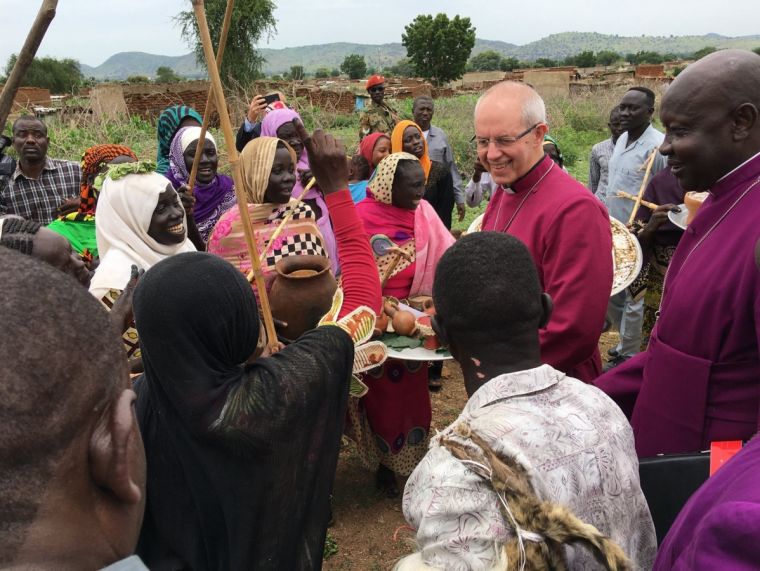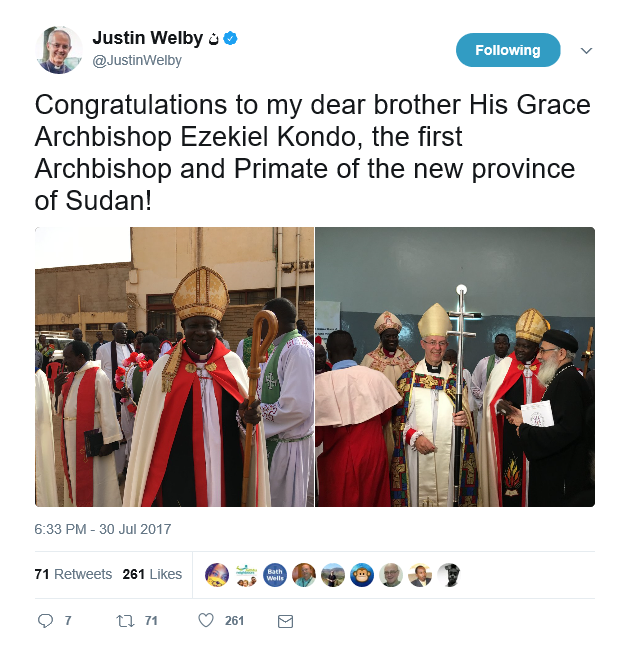
The advent of the world’s newest country, South Sudan, in 2011 has not been without its impact. Not only has it spawned a civil war and one of the world’s biggest current humanitarian crises, but also the need for a new Province in the global Anglican Communion. This weekend, the Archbishop of Canterbury was in Khartoum to inaugurate the Communion’s 39th Province, that of Sudan.
Previously, after independence, the Anglican Province of Sudan and South Sudan had been headquartered in South Sudan, where the majority of the Anglican Episcopal Church of Sudan’s (ECS) four-and-a-half million members live. South Sudan has since been wracked by civil war along first political, then tribal lines, and it was also difficult for a Primate based in a neighbouring country to oversee the Church in Sudan*.
Now the ECS in Sudan has a new Primate, Archbishop Ezekiel Kumir Kondo Kuku who was formally installed in All Saints’ Cathedral, Khartoum on Saturday. He had already become the first Archbishop of Sudan in 2014 for a new internal Anglican Province, made up of five dioceses, intended to address the new political reality.
Justin Welby hailed Sunday’s ceremony in Khartoum as a “new beginning” for Christians in Sudan.

He also told the BBC that, when he had met the Sudanese President (the day after the ceremony) he had raised the issue of religious freedom “strongly” with Omar al-Bashir.
“In England, the Church of England often seeks to protect Muslims when they are under pressure,” Welby told AFP, suggesting, the agency said, that he expected the same in Sudan when it came to protecting Christians.
The Province’s launch comes weeks after Sudan’s most well-known Christian (who hit global headlines in 2014 when sentenced to death for apostasy and 100 lashes for adultery) told an annual meeting at the European Parliament (EP) that the plight of Christians in Sudan is getting worse.
Dr Mariam Ibrahim told how her story (including imprisonment for six months) is not unique. Sudan is one of ten countries featured in the 2017 Interim Report of the EP Intergroup on Freedom of Religion or Belief and Religious Tolerance. The report says of Sudan that “religious diversity continues to be extensively challenged. Laws from the 1991 criminal code on apostasy and blasphemy have not been applied within all the states. This violates both the international agreements signed by Sudan, and contradicts its interim Constitution of 2005”.
The Intergroup is also concerned about the prevalence of Sharia (Islamic law) and the consequences for religious minorities. As Dr Ibrahim told World Watch Monitor in Brussels, under Sudan’s interpretation of Sharia, a daughter’s religion is defined as that of her father, so that she was treated as a Muslim, despite her Ethiopian Orthodox mother raising her as a Christian. Her marriage to a South Sudanese Christian in church was first treated as “adultery”, and then she was treated as an apostate – deserving the death penalty.
Ibrahim, now living in exile in the United States, talked about the discrimination faced by Christians in Sudan (whom she now runs a charity to support through advocacy):
“You can’t say… as the Sudanese government says: ‘We respect the freedom of religion’. They’re saying that, they keep saying that… The other day a representative at the UN Council [said] ‘We are respecting’… But you can’t say that at the same time as you are arresting [a] Christian woman because she’s not wearing a headscarf, or all that stuff.”
Ibrahim ended by stressing that her problems were symptomatic of those currently faced by the Christian community in Sudan: the most current being the demolition of churches, an issue raised with its government by the EU Special Envoy for Freedom of Religion or Belief, Ján Figeľ, when he visited in March. Then, the Minister for Religious Endowments had promised him a delay to demolition plans of more than 25 churches, ranging from Catholic to Coptic Orthodox, the Sudan Presbyterian Evangelical Church (SPEC) and Pentecostal Churches.
However, since then that Minister has been replaced, at least two more churches have been demolished and a church worker killed when he tried to intervene to defend church property from government takeover.
These latest church demolitions (both were of Sudan Church of Christ churches, a smaller denomination than the ECS) prompted a bold “open” letter from that denomination’s leaders to their government, protesting about “the systematic violation of Christian religious freedoms”. Apart from demolition of churches, they detailed the “hard conditions” they have faced in recent years, including confiscation of church property, government failure to allocate land for construction of any new churches, and travel restrictions on senior church leaders.
Figeľs visit to Sudan in March was also to seek the release of two Sudanese pastors who had not been released when the Czech aid worker they were helping was freed – after a year in prison – by Presidential pardon in February. (They were eventually released in May).
However, the Archbishop of Canterbury spoke of seeing Christians and Muslims “co-existing powerfully and effectively” when he had visited the southern diocese of Kadugli in the Nuba Mountains (where there are a significant number of Christians) before the Khartoum ceremony. Such tolerant co-existence needed freedom, Welby said.
“My prayer for Sudan is that there will be freedom continually so that Christians may live confidently, blessing their country. The more they are free, the more they will be a blessing to Sudan,” he said.
He also praised the Khartoum government for welcoming refugees from the conflict in South Sudan and thanked it for sending representatives to the inauguration service.
“No government anywhere in the world need fear Christians,” he told them.
Abu Bakr Osman, the new Minister of Religious Guidance and Endowments, said he was “overwhelmed with happiness” at the occasion of the launch of the new Anglican province. He said there was a feeling of the country coming together and that living in harmony and unity would be a source of strength, reported the Anglican Communion News Service.
The Archbishop of Canterbury flew on from Khartoum to northern Uganda to visit refugee camps.
Uganda, which registered more refugees than any other country in 2016, has taken in around a million people who have fled across the border to escape the fighting in South Sudan.
The Archbishop of Canterbury is to visit the camps with the Primate of Uganda, Archbishop Stanley Ntagali.
In January 2016, Ntagali left the Anglican Primates’ conference early, objecting to the process by which the Primates were to discuss the Church’s stance towards the Episcopal Church USA and the Anglican Church of Canada over same-sex marriage.
*(World Christian Database 2017: estimated at about two million, roughly half Catholic/Orthodox and half Protestant.)